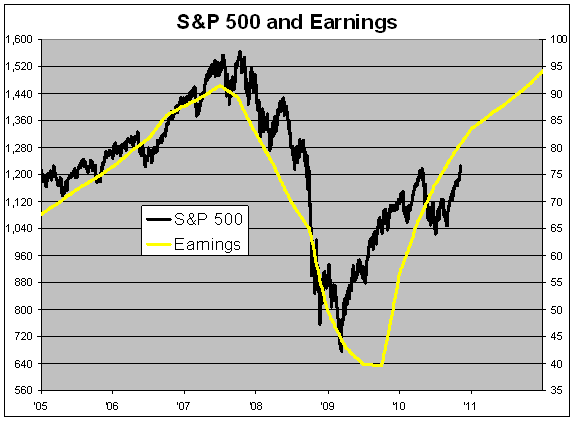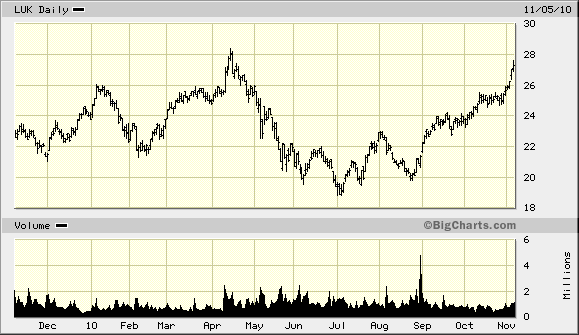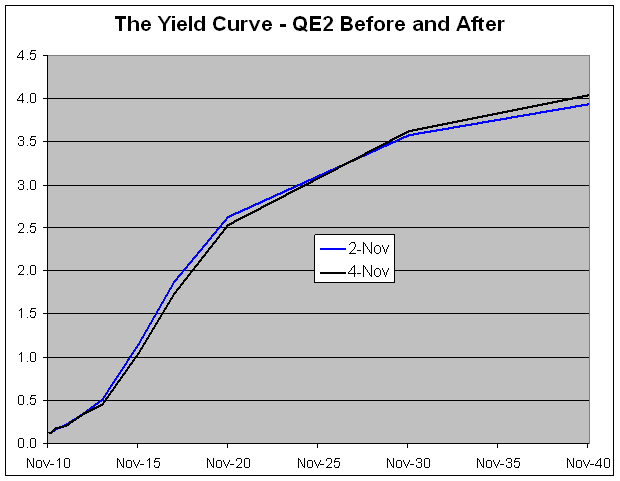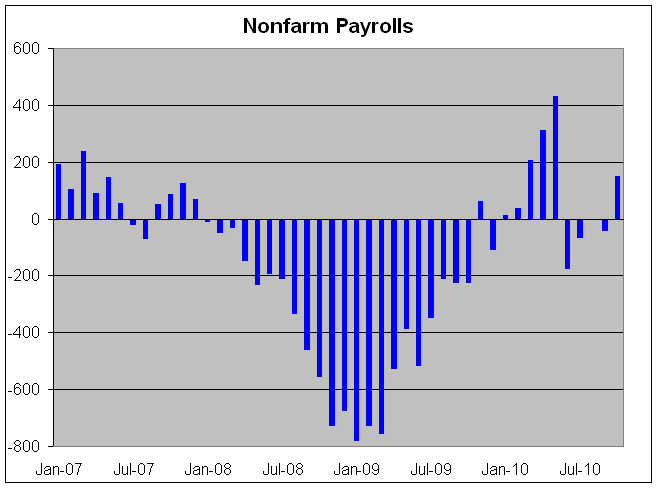-
Short-Term Rates on Growth and Value
Posted by Eddy Elfenbein on November 8th, 2010 at 2:08 pmI was curious to see what the impact of changes in short-term interest rates is on growth and value stocks.
I used the Vanguard Growth (VIGRX) and Vanguard Value (VIVAX) funds as proxies and looked at how they reacted to changes in the 90-day T-bill. The data goes back to 1993.
I found that there were 1,737 days when short-term rates fell, 1,739 days when short-term rates rose and 950 days when short-term rates stayed the same. I then averaged out those periods to annualized periods.
When short-term rates fell, Value fell by 21.78% while Growth fell by 18.96%.
When short-term rates stayed the same, Value rose by 16.65% and Growth rose by 19.10%.
Finally, when short-term rates rose, Value rose by 42.54% and Growth rose by 36.13%.
-
S&P 500 to 1500?
Posted by Eddy Elfenbein on November 8th, 2010 at 11:35 amHere’s a look at the S&P 500 along with its earnings.
The black line is the index and it follows the left scale. The yellow line is its trailing four-quarter operating earnings and it follows the right scale. I’ve arranged it so the two lines are scaled at a ratio of 16-to-1. This means that whenever the lines cross, the market’s P/E Ratio is exactly 16.
Why 16?
There’s nothing special about 16 except that historically that’s been about the average ratio.
Let me say a few things about the P/E Ratio. It’s far from a perfect measure of the market, but it’s still a very good measure. You also want to look at other measures like dividend, cash and interest rates, but for this post, I want to concentrate on earnings.
Earnings have rebounded quite sharply and stock prices have kept up. From here, however, the earnings growth is projected to tail off. Earnings will still grow, but not at the rate we saw before.
(Note that I prefer to look at operating earnings instead of as-reported earnings. I think this is a better metric for looking at the broad market.)
According to the latest forecasts, the S&P 500 is projected to earn $94.27 next year. At a ratio of 16-to-1, that translates to an S&P 500 of 1508. The index would have to rise by 23% over the next 14 months to get there, which is very reasonable.
But even if the market’s P/E Ratio drops to 14 by the end of next year, the S&P 500 would still have to rally close to 8% to get there. And that’s a very conservative estimate.
The only danger is a Double Dip which looks increasingly unlikely. In fact, the Double Dip hysteria of this summer made the Y2K frenzy of 1999 look like reasoned discourse.
-
Buy List Hits All-Time High
Posted by Eddy Elfenbein on November 8th, 2010 at 10:47 amWe had very good news on Friday. Thanks to a late market surge, our Buy List broke out to an all-time high.
For all of 2010, we’re up 14.54%. Including dividends, we’re up 16.03%. The S&P 500 is up 9.93%, or 11.77% including dividends.
We’re on our way toward beating the market for the fourth straight year. Best of all, we’ve done with ZERO trading during the year.
For the complete history of the Buy List (four years and a little over ten months), we’re up 33.36% compared with 8.77% for the S&P 500. Both of those numbers include dividends.
-
Sysco Earns 51 Cents Per Share
Posted by Eddy Elfenbein on November 8th, 2010 at 10:17 amThe last of our stocks reported earnings for this earning season. Before the bell, Sysco (SYY) said it earned 51 cents per share which matched Wall Street’s expectations. Thanks to food inflation, Sysco’s revenues rose 7.4% to 9.75 billion which beat consensus by $20 million.
From the company’s press release:
“I am pleased with the volume growth and productivity improvements our operating companies produced during the quarter,” said Bill DeLaney, Sysco’s president and chief executive officer. “While our overall sales increase and operating expense management were encouraging, we missed our goal for operating income growth, largely due to a decline in gross profit margin and higher pension costs. Our entire leadership team is focused on effectively leveraging sales growth as the fiscal year progresses.”
This is slightly disappointing, but it’s still an improvement over last earnings season when Sysco missed by a penny per share. This is still a decent stock and I expect a small dividend increase soon.
Here’s what I wrote over the summer:
If you’re looking for a decent bargain, shares of Sysco (SYY) look pretty good now that they’re under $29. Thanks to the market’s recent unpleasantness, the stock has gotten as low as $28.46.
Sysco is a conservative company. They pay a 25-cent quarterly dividend, so the current yield is about 3.5% which is well above the 10-year T-bond yield.
Sysco’s business had been feeling the squeeze of lower prices. The company saw three straight quarters of declining earnings (not a lot, but declining). They responded by cutting overhead and their earnings started to perk up. Last quarter was interesting because it was the first time since 2008 that sales also grew. That’s very good news because you can’t cut overhead forever; you need to start growing your sales.
Sysco has now beaten earnings for four straight quarters. Sysco reports late, so the next earnings report probably won’t come out until around August 10. Plus, Sysco’s fiscal year ends on June 30 so this upcoming report will be for their fiscal fourth quarter.
The company will probably earn around 60 cents per share, give or take, which comes out to $1.96 for the year. At $29 per share, that’s not bad. I don’t expect Sysco to grow its earnings by a lot for their next fiscal year, but they almost certainly should be higher than last year.
Sysco is a buy any time it’s below $30. Below $28 would be much better.
Here’s a final summary of earnings for our Buy List:
Company Ticker Symbol Earnings Date Estimated EPS Reported EPS Intel INTC 12-Oct $0.50 $0.52 Gilead GILD 19-Oct $0.87 $0.90 Johnson & Johnson JNJ 19-Oct $1.15 $1.23 Stryker SYK 19-Oct $0.77 $0.80 SEI Investments SEIC 20-Oct $0.26 $0.30 Baxter BAX 21-Oct $0.97 $1.01 Eli Lilly LLY 21-Oct $1.15 $1.21 Reynolds American RAI 21-Oct $1.34 $1.35 Fiserv FISV 26-Oct $1.00 $1.04 AFLAC AFL 26-Oct $1.39 $1.45 Nicholas Financial NICK 28-Oct $0.30 $0.33 Moog MOG-A 4-Nov $0.70 $0.71 Wright Express WXS 4-Nov $0.68 $0.72 Becton Dickinson BDX 4-Nov $1.25 $1.31 Sysco SYY 8-Nov $0.51 $0.51 -
Morning News: November 8, 2010
Posted by Eddy Elfenbein on November 8th, 2010 at 7:18 amEuro Hurt as Peripheral Debt Jitters Resurface
Oil Falls From Two-Year High in New York as Stronger Dollar Trims Demand
The Man Who Called the Financial Crisis—70 Years Early
China Says Fed Easing May Flood World Economy With ‘Hot Money’
G-20 Spat Risk Eases as U.S. Eschews Pushing Targets
Top US, South Korea Officials Hold Trade Pact Talks
Nikkei Hits 3-month Closing High
Irish Debt Woes Revive Concern About Europe
CEOs Most Optimistic on U.S. Profits in Bull Signal for S&P 500
-
Bernanke at Jacksonville University
Posted by Eddy Elfenbein on November 5th, 2010 at 11:49 pmHere’s a 53-minute video of Bernanke answering questions from students. It’s long, but he’s good at explaining complicated issues clearly.
-
Leucadia National 3Q earnings falls
Posted by Eddy Elfenbein on November 5th, 2010 at 8:01 pmDiversified holding company Leucadia National Corp. said Friday that its third-quarter net income fell 22 percent as it lost money on securities, and income related to associated companies fell.
Net income in the three months to Sept. 30 fell to $287.7 million, or $1.17 per share, down from $370.2 million, or $1.50 per share.
Revenue rose to $185.9 million from $143.4 million.
It lost a net $64,000 in securities, after a gain of $9.6 million a year earlier. The loss from operations rose to $62.2 million from $38.4 million. Income related to associated companies, net of taxes, fell to $324.7 million from $379.5 million.
Shares rose 29 cents, or 1.1 percent, to close at $27.30.
-
“Kehehehehehehehehehe Yourself!”
Posted by Eddy Elfenbein on November 5th, 2010 at 3:01 pmThat’s enough market stuff for one week. Have a great weekend and enjoy some classic Ernie and Bert.
-
The Yield Curve’s Reaction to QE2
Posted by Eddy Elfenbein on November 5th, 2010 at 11:01 amI wanted to show you why the QE2 announcement was such a big deal. Here’s a look at the yield curve from before and after. The blue line is for Tuesday. The black line is yesterday.
I doesn’t look terribly dramatic, but the middle part of the curve got squished down while the end got pushed up. The spread between the middle and the end is at a record.
-
October Unemployment Unchanged at 9.6%
Posted by Eddy Elfenbein on November 5th, 2010 at 8:32 amThe good news is that nonfarm payrolls rose by 151,000. Private sector jobs increased by 159,000. Although there are still 14.8 million Americans who are unemployed, this was a better-than-expected report:
The job total numbers were revised higher for August and September. For August, instead of a loss of 57,000 jobs, it’s now 1,000. September’s loss was revised from 95,000 to 41,000.
Over the last 10 years, the U.S. labor market has grown by nearly 11 million, yet the number of jobs has increased by 1.7 million. That’s like an 84% unemployment rate of new workers.
-
-
Archives
- May 2025
- April 2025
- March 2025
- February 2025
- January 2025
- December 2024
- November 2024
- October 2024
- September 2024
- August 2024
- July 2024
- June 2024
- May 2024
- April 2024
- March 2024
- February 2024
- January 2024
- December 2023
- November 2023
- October 2023
- September 2023
- August 2023
- July 2023
- June 2023
- May 2023
- April 2023
- March 2023
- February 2023
- January 2023
- December 2022
- November 2022
- October 2022
- September 2022
- August 2022
- July 2022
- June 2022
- May 2022
- April 2022
- March 2022
- February 2022
- January 2022
- December 2021
- November 2021
- October 2021
- September 2021
- August 2021
- July 2021
- June 2021
- May 2021
- April 2021
- March 2021
- February 2021
- January 2021
- December 2020
- November 2020
- October 2020
- September 2020
- August 2020
- July 2020
- June 2020
- May 2020
- April 2020
- March 2020
- February 2020
- January 2020
- December 2019
- November 2019
- October 2019
- September 2019
- August 2019
- July 2019
- June 2019
- May 2019
- April 2019
- March 2019
- February 2019
- January 2019
- December 2018
- November 2018
- October 2018
- September 2018
- August 2018
- July 2018
- June 2018
- May 2018
- April 2018
- March 2018
- February 2018
- January 2018
- December 2017
- November 2017
- October 2017
- September 2017
- August 2017
- July 2017
- June 2017
- May 2017
- April 2017
- March 2017
- February 2017
- January 2017
- December 2016
- November 2016
- October 2016
- September 2016
- August 2016
- July 2016
- June 2016
- May 2016
- April 2016
- March 2016
- February 2016
- January 2016
- December 2015
- November 2015
- October 2015
- September 2015
- August 2015
- July 2015
- June 2015
- May 2015
- April 2015
- March 2015
- February 2015
- January 2015
- December 2014
- November 2014
- October 2014
- September 2014
- August 2014
- July 2014
- June 2014
- May 2014
- April 2014
- March 2014
- February 2014
- January 2014
- December 2013
- November 2013
- October 2013
- September 2013
- August 2013
- July 2013
- June 2013
- May 2013
- April 2013
- March 2013
- February 2013
- January 2013
- December 2012
- November 2012
- October 2012
- September 2012
- August 2012
- July 2012
- June 2012
- May 2012
- April 2012
- March 2012
- February 2012
- January 2012
- December 2011
- November 2011
- October 2011
- September 2011
- August 2011
- July 2011
- June 2011
- May 2011
- April 2011
- March 2011
- February 2011
- January 2011
- December 2010
- November 2010
- October 2010
- September 2010
- August 2010
- July 2010
- June 2010
- May 2010
- April 2010
- March 2010
- February 2010
- January 2010
- December 2009
- November 2009
- October 2009
- September 2009
- August 2009
- July 2009
- June 2009
- May 2009
- April 2009
- March 2009
- February 2009
- January 2009
- December 2008
- November 2008
- October 2008
- September 2008
- August 2008
- July 2008
- June 2008
- May 2008
- April 2008
- March 2008
- February 2008
- January 2008
- December 2007
- November 2007
- October 2007
- September 2007
- August 2007
- July 2007
- June 2007
- May 2007
- April 2007
- March 2007
- February 2007
- January 2007
- December 2006
- November 2006
- October 2006
- September 2006
- August 2006
- July 2006
- June 2006
- May 2006
- April 2006
- March 2006
- February 2006
- January 2006
- December 2005
- November 2005
- October 2005
- September 2005
- August 2005
- July 2005





 Eddy Elfenbein is a Washington, DC-based speaker, portfolio manager and editor of the blog Crossing Wall Street. His
Eddy Elfenbein is a Washington, DC-based speaker, portfolio manager and editor of the blog Crossing Wall Street. His